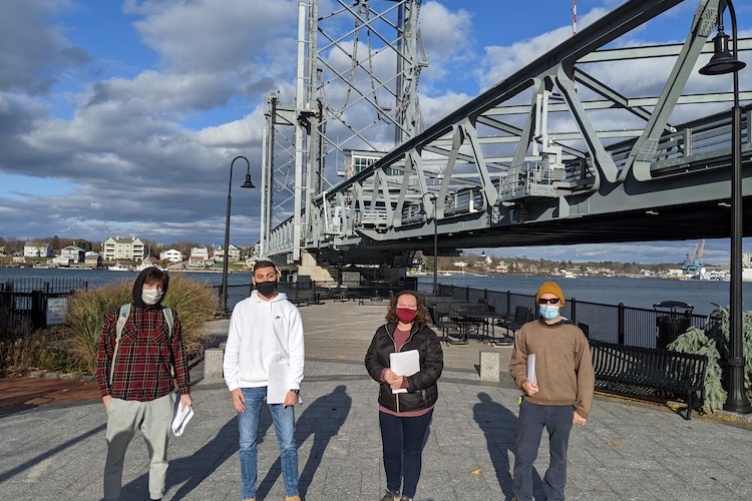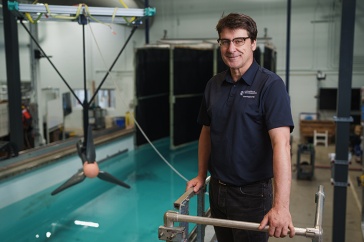
(L to R) Joe Degregorio ’21, Brandon Belmonte ’21, Jessica Nekowitsch ’21 and Andrew Godfrey ’21. (Courtesy photo)
For a quartet of senior UNH environmental engineering students, there’s something in the water. And one of their last acts prior to graduation will be helping to remove it.
The Seacoast’s Great Bay has been on the U.S. Environmental Protection Agency (EPA) radar for years due to declining water quality as a result of increasing levels of pollution from both wastewater and stormwater. The agency has issued a Clean Water Act permit to kickstart efforts to turn that tide, and the four students are at the forefront of work they hope can lead to a healthier future for the bay.
The students - Brandon Belmonte ’21, Joe DeGregorio ’21, Jessica Nekowitsch ’21 and Andrew Godfrey ’21 – have partnered with the city of Portsmouth as part of their capstone project in environmental engineering and are reviewing stormwater treatment sites throughout the city to evaluate levels of pollutants like nitrogen, phosphorus and other suspended solids making their way into the waterways, so the city can determine how to best improve its equipment to help meet the EPA’s goals.
“The Great Bay is one of the most important bodies of water or marine environments in New England,” DeGregorio says. “This is one of the best experiences and one of the most useful experiences I’ve had as an undergrad, to give me that real-world practice that relates to what I’ll be doing in the future.”
“It’s a real-world example of engineering work. To have these experiences before we leave college, I don’t think the importance of that can be overstated.”
Students are evaluating stormwater runoff data from the last 10 years at both publicly and privately-owned stormwater treatment best management practice (BMP) systems throughout Portsmouth in hopes of providing the city with a sense of which BMPs are more efficient at removing certain pollutants and which will need adjusting to meet EPA standards.
“We’re hoping some of what they come up with will help guide us in future decisions on what to install on future projects,” Jamie McCarty, GIS manager in the Portsmouth Department of Public Works and the students’ point-of-contact at the city, says. “The city loves being able to work with and mentor these students.”
Portsmouth’s public works department has been mentoring UNH students for years, primarily through a long-standing internship program. But the COVID-19 pandemic prompted internships to be canceled last spring, and the department discovered the capstone engineering project as a way to continue connecting with hopeful future engineers.
The students spent the first semester of the school year collecting data from sites throughout Portsmouth and have spent this semester beginning to enter the data into Pollutant Tracking and Accounting Project (PTAP) software, developed as a collaboration between the New Hampshire Department of Environmental Services (DES) and the UNH Stormwater Center.
Students enter data in a wide variety of categories (including BMP type, such as sand filter or gravel wetland, and designed storage capacity) into the PTAP software, and the software provides a value to better quantify pollutant levels.
“Getting the chance to be on the exploratory end of this new technology and learning about how well these systems actually remove pollutants from the environment is what really drew me to the project,” says Nekowitsch. “It’s a real-world example of engineering work. To have these experiences before we leave college, I don’t think the value of this opportunity can be overstated.”
COVID-19 has forced meetings to remain virtual, but the UNH student team meets with McCarty every other week, sharing their progress and giving him an opportunity to provide any guidance. The work is intentionally very independent, McCarty says, because it’s “supposed to be a simulation of what it would be like to work as a consultant on a project like this.”
And just like in the professional world, you can’t always choose your teammates. All of the students in the engineering capstone had to rank potential projects by level of interest, and students were selected for each one accordingly. But despite not having a say in how the project team was formed, the UNH group quickly developed a camaraderie that has made the work easy and collaborative.
“You’re not always going to be able to pick the people you work with in the real world, but it’s been great working with new people and figuring it all out together,” says Belmonte, who has filled the role of project manager, acting as the primary contact with McCarty, ensuring the project stays on schedule and delegating tasks to teammates when appropriate. “I think it’s been really beneficial.”
It's certainly been beneficial to Portsmouth, as the work the students have done has made a significant dent in a project with a formidable scope. McCarty looks forward to future collaboration with UNH, either through internships, capstone projects like this, or both.
The result of that work is a legacy the students are proud to carry with them. Whenever the project comes to full fruition – which presumably would mean cleaner water in Great Bay – they will be able to say they played a key early role in preserving an important natural resource.
“I think that’s one of the great things about engineering in general is that even if you don’t get to see a project through from beginning to end, you know that you are leaving an impression of yourself in the work,” Nekowitsch says. “That it will go on to actually help this community is really rewarding.”
-
Written By:
Keith Testa | UNH Marketing | keith.testa@unh.edu



















































